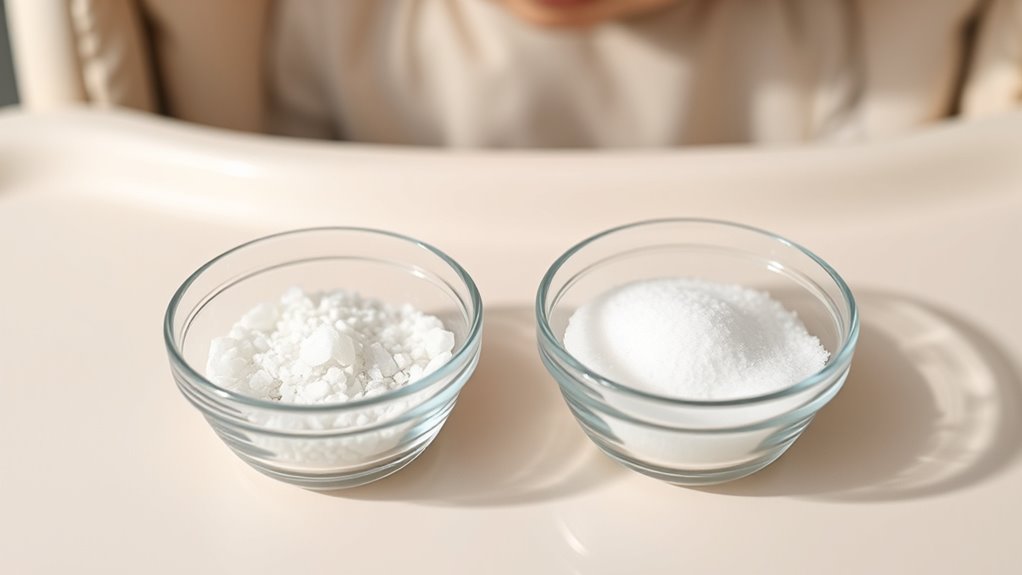Many baby foods contain hidden amounts of salt and sugar that can affect your child’s health. Manufacturers often add these to enhance flavor, even in “natural” products, making it hard to tell how much is there. Excess salt can strain your baby’s kidneys, while too much sugar can lead to dental issues and weight gain. Staying vigilant about labels is key—continue exploring to learn how to make healthier choices for your little one.
Key Takeaways
- Hidden salt and sugar can be present in baby foods through flavorings and preservatives, making it hard to identify added amounts.
- Babies’ taste buds are developing; excessive salt and sugar can influence long-term preferences and health.
- Always read labels carefully, looking for ingredients like “natural flavor” and avoiding products with sodium-based preservatives.
- Prefer minimally processed, organic, or homemade baby foods to control salt and sugar content.
- Limiting added salt and sugar supports healthy growth, reduces health risks, and fosters better eating habits early in life.

Have you ever wondered how much sugar and salt are added to baby food? It’s a common concern, especially since many parents want to ensure their little ones eat healthily. Many baby foods contain ingredients meant to enhance taste and extend shelf life, but it’s important to understand what’s really in those jars. Often, manufacturers use natural flavorings to make the food more appealing without relying on artificial additives. These natural flavorings are derived from fruits, vegetables, or herbs, and they’re generally considered safe. However, some companies add preservative additives to prolong shelf life, which can sometimes include sodium-based preservatives or other chemicals. While these preservatives help keep the product fresh, they can also contribute to the overall salt content, making it essential for parents to read labels carefully.
Many baby foods contain natural flavorings and preservatives that can hide added salt and sugar.
You might notice that some baby foods taste surprisingly salty or sweet. That’s because manufacturers sometimes add small amounts of salt or sugar to improve flavor, even though it’s not always necessary. Naturally, babies don’t require added salt or sugar in their diets; their taste buds are still developing, and exposing them to high levels can set unhealthy preferences for later in life. The tricky part is that some foods labeled as “healthy” or “all-natural” might still contain hidden salt or sugar, often disguised by terms like “natural flavorings” or “preservative additives.” These ingredients can sometimes mask the true nutritional content, making it harder for parents to make informed choices. Being aware of hidden additives can help parents better evaluate the nutritional quality of baby foods.
It’s up to you to become a vigilant label reader. Look for products that list whole fruits, vegetables, or grains as primary ingredients, rather than those with added sugars or salts. When natural flavorings are used, they’re usually listed simply as “natural flavor” or “flavoring,” which is preferable to artificial flavors. Be cautious of preservatives that contain sodium compounds, as they can elevate the salt content in baby food. High salt intake isn’t suitable for infants because it can strain their kidneys and lead to a preference for salty foods later on. Similarly, added sugars can contribute to dental issues and increase the risk of childhood obesity.
Ultimately, your goal should be to offer your baby foods that are minimally processed and free from unnecessary additives. Choosing organic or homemade options can give you better control over what your little one consumes. While some natural flavorings are safe and help make food more appealing, always be wary of preservative additives that might contain hidden salt or sugar. Your vigilance ensures that your baby develops healthy eating habits from the start, avoiding the pitfalls of overly processed, heavily flavored foods.
Conclusion
Think of your baby’s diet like tending a delicate garden. Too much sugar and salt are like invasive weeds that can choke out healthy growth. By choosing nourishing, natural foods and limiting these extras, you’re cultivating a vibrant, balanced environment where your little one can thrive. Remember, you’re the gardener guiding their future—nurture with care, and watch them blossom into strong, happy children. Keep it simple, keep it healthy, and let nature do its best work.










